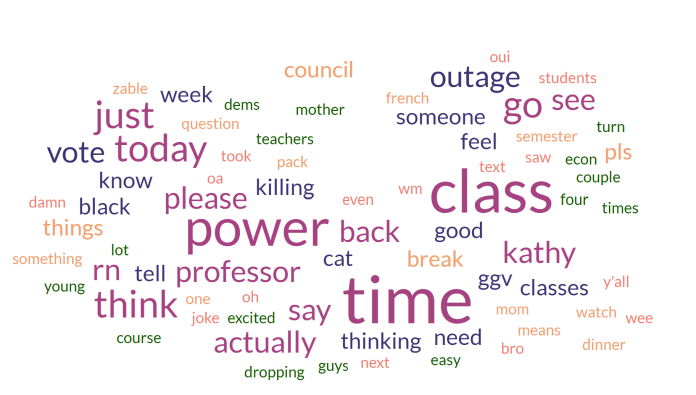From gossip and rumors to memes and drama. What exactly do people talk about on YikYak? The app has long been a place where students gather to anonymously discuss campus events, college life and share miscellaneous memes. Using a data set of 100 YikYak posts, we investigated popular topics of anonymous discussion on campus.
YikYak first launched as a website and app in 2013, but was shut down in 2017 after a drastic drop in downloads. Relaunched in 2021, as an iOS app, it has become a popular source of on-campus news. Students like Eddie Bauer ’26 use YikYak to keep up with campus events.
“I feel like it’s just the quickest way to see what’s going on on campus because it’s from the students themselves,” Bauer said. “It makes me aware of stuff going on in college that I otherwise wouldn’t have known about — some people like to use it for advertising, too. I see people discussing anything you could imagine on the app. People will make fun of the power going out or crack jokes about Kathy Rowe’s Tesla.”
The Flat Hat conducted data collection on Oct. 16th, using a proxy scanner to capture incoming YikYaks and build a sample of 100 different posts. Subsequently, the data was cleaned of expletives and stop words. An engagement index based on comments and upvotes was used to measure which topics were engaged with the most.
Using a word cloud, we found that the words “class,” “time” and “power” were the most frequently used. Of course, class would be a popular topic of discussion for students at a university — another popular word in the dataset is “professor.” The frequency of the word “power,” was likely related to data collection occurring close to a power outage at Swem Library.
Other words that were popularly used in the sample of YikYak posts were “vote,” in relation to local city council elections and national elections. College President Katherine Rowe’s name also made many appearances in both humorous contexts and discussions on decisions made by the College’s administration.
“I just hop on when I know that something has happened on campus and I need to be in the know. I feel like it has more to do with being nosey than genuinely being interested. I hop on when everyone else is commenting, such as when Caf is on fire,” Aja Bauer ’25 said.
Being a completely anonymous platform has benefits and costs. Anonymity enables people to speak more freely but also can open the door to hateful sentiment free from backlash.
“It’s got a bad and negative reputation for very obvious reasons; it’s just easy for a lot of people to be bullies if they're behind the anonymous little emoji,” Logan Edwards ’26. “In the past, people have been pretty empathetic. [They’ve] been open about their feelings and good on spreading positivity — that’s usually what my posts try to consist of.”
Sentiment analysis is a technique used to determine the emotional tone behind a body of text, categorizing it as positive, negative or neutral. Individual words in the dataset are assigned weights by a model to determine the positiveness of the text. Using a simple sentiment analysis algorithm from the website, uClassify, we found that most posts in the sample tend to take a more negative tone.
To expand on the sentiment analysis, we can take a look at what the data shows as the most discussed topics. We used data for comments and upvotes to create a simple engagement index. The above scatterplot shows the frequency of specific words on the dataset and the engagement.
Some students have questioned the reliability of YikYak’s engagement metrics, particularly upvotes.
Matthew Esposito ’26 expressed a sentiment along these lines.
“I do think that it inflates the metrics and the upvotes. There are some posts on there that are at 1,500 [upvotes] – I don’t even think that many people use the app here,” Esposito said.
The scatterplot data is biased towards generic articles and conjunctions that make up sentences. However, ignoring these, some popular words that got engagement were “girls,” “guys,” “cat” and “vote,” which produced index values of 12,000, 11,102, 11,164 and 10,160, respectively. The topics of professors and Rowe also made appearances high in the list based on the engagement index. This sample of 100 posts produced 176 unique words that appeared more than once in the sample.
Additionally, YikYak offers the ability to join niche communities to discuss specific topics such as celebrity news and politics.
For Ved Patel ’25 the diversity of topics being discussed is a pro for the app.
“I kind of feel like more of a member of the community just by being there. It provides you with a topic that you can discuss with everyone,” Patel said.

